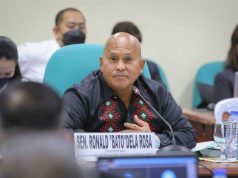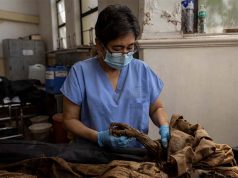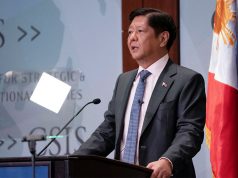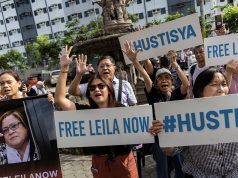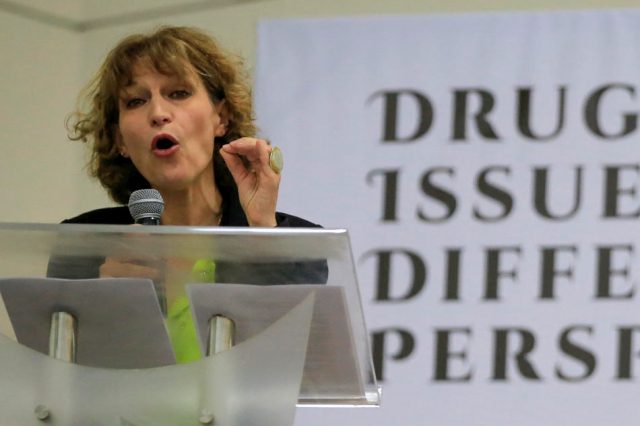
On Friday at the forum Different Perspectives: A Policy Forum held at the University of the Philippines, Philippine National Police (PNP) Spokesman Chief Supt Dionardo Carlos on Friday asked for a recommendation as to “how to address the drug problem with an estimate of 4 million people hooked on illegal drugs?”
In effect, Carlos was asking: Are there “better ways?”
Carlos added, “the ways of the PNP is to reach out to the drug offenders (users and pushers) and offer the avenue to change through Project Tokhang, resulting in 1,266,966 surrenderers in a nation with an estimate of 4M drug users.
“The PH govt through its Department of Health and Department of Social Work and Development, extends all possible help to allow these drug addicts to be treated and rehabilitated either by community-based wellness and rehab programs or treatment in drug rehab facilities. This was just in a span of eight months.”
He urged Callamard to look at the work of the Inter-Agency Committee on Anti Illegal Drugs and the National Anti Drug Plan of Action, which will show what is the policy and direction of the govt. to address the drug problem.
Dr. Agnes Callamard, United Nations Special Rapporteur on Extrajudicial Summary or Arbitrary Executions at Drug Issues, who delivered the keynote at the forum, shared that the new norm in dealing with the scourge of drugs is for governments NOT to commit to “the war on drugs” approach, but rather, quite to the contrary, “to a balanced, multi-faceted, multi-disciplinary approach, and place great emphasis on health, rights, and justice.”
The bottom line, according to Agnes Callamard, is that there are other ways, better ways, evidence-based, scientific ways, of addressing drug abuse and trafficking, with emphasis on health, rights, and justice – ways that do not make matters worse.
A year ago, a special session of the UN General Assembly had called for more effective approaches other than the punishment/punitive model that some governments have adopted, by upholding the inherent dignity of all individuals, to respect, protect and promote all human rights, fundamental freedoms and the rule of law and in the development and implementation of drug policies.
Callamard stated: “the general assembly of the world’s governments recognized explicitly that the war on drugs – be it community based, national or global – does not work. And further, that many harms associated with drugs are not caused by drugs, but by the negative impacts of badly thought out drug policies.
“They not only fail to address substantively drug dependency, drug-related criminality, and the drug trade, they add more problems, as has been well documented, around the world.”
Dr. Callamard, underscored that the punitive model doesn’t work, and governments should commit, instead, to a balanced, multi-faceted, multi-disciplinary approach, placing great emphasis on health, rights, and justice.
“They [the governments] did not suggest that death penalty was an appropriate or effective response to drugs trafficking, let alone drug use; Instead, they spoke about proportionate sentencing and alternative punishments.”
They added that punitive measures tend to escalate and/or compound problems such as:
· Killings, extra-judicial or by criminal gangs; the break-down of the rule of law;
· Vigilante crimes,
· Torture, ill-treatment and sexual violence;
· Prolonged pre-trial detention, mandatory sentencing and disproportionately long sentences for drug possession, etc.
· Detention in drug and rehabilitation centres without trial or a proper evaluation of drug dependency;
· Non-consensual experimental treatment;
“And further, badly thought out, ill-conceived drug policies can foster a regime of impunity infecting the whole justice sector and reaching into whole societies, invigorating the rule of violence rather than of law; eroding public trust in public institutions; breeding fear and leading people to despair.”
The bottom line, according to Callamard, is that there are other ways, better ways; evidence-based, scientific ways, of combating drug abuse and trafficking – ways that do not make matters worse.
Read Dr. Callamard’s keynote here:
<a href=”https://www.facebook.com/notes/flag-anti-death-penalty-task-force/keynote-speech-at-drug-issues-different-perspectives-a-policy-forum/1861749944085168/” target=”_blank”>Keynote Speech at Drug Issues, Different Perspectives: A Policy Forum</a>




